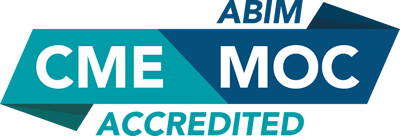
COURSE CREDITS & HOURS
AMA PRA Category 1 Credits™14 ACPE Credits
14.0 (part II) MOC points in medical knowledge in the American Board of Internal Medicine's (ABIM) Maintenance of Certification (MOC) program
4½ Hours of Pharmacology for NPs
COURSE FEES
TARGET AUDIENCE
PROGRAM PURPOSE
- Bootcamp for Elevated Liver Function Tests
- Describe why fatty liver disease is becoming the number one source of cirrhosis and hepatoma in the US
- Manage the treatment of fatty liver
- Celiac Disease, or Something Else?
- State the usefulness of celiac genetic testing
- Clinical Dilemmas in GI Bleeding
- Identify the risk factors that leads to GI bleeding
- Colon Cancer Prevention 2018
- Define the best practices that lead to colon cancer prevention
- Dysphasia/Dyspepsia/GERD and the Primary Care Provider
- Describe the difference between dyspepsia and GERD
- Develop a clinical approach when PPIs fail
- Irritable Bowel Syndrome: Tools for Successful Treatment
- Select the "appropriate" workup for Irritable Bowel Syndrome
- Probiotics 2018: Fulfilling the Promise
- Recognize the proven uses of Probiotics
- Health Promotion: Encouraging a Healthy Body, Mind, and Spirit
- Assess the patient's current state of physical, psychological, and spiritual health.
- Analyze the patient's current dietary and exercise practices.
- Discuss an individualized health-promotion strategy for each patient.
- Sleep Disorders: Insomnia and Excessive Daytime Somnolence
- Describe the four stages of sleep and identify sleep disorders associated with each stage of sleep.
- Discuss elements of a sleep hygiene program.
- Explain the appropriate use of stimulant medications for patients with excessive daytime somnolence.
- "Ooh, My Aching Head!": Managing Migraine, Tension-Type and Cluster Headaches
- Discuss the appropriate use of brain imaging in evaluating patients with headache.
- Describe the appropriate use of abortive and preventive medications in the treatment of migraine.
- Describe the distinguishing clinical characteristics of tension-type and cluster headaches.
- Male Sexual Disorders: Hypogonadism, Erectile, and Ejaculatory Dysfunction
- Elicit a through, non-judgmental sexual history.
- Describe appropriate laboratory and radiologic testing in the evaluation of male sexual problems.
- Discuss the effects, risks, and benefits of testosterone replacement and medications for erectile and ejaculatory dysfunction.
- Hypertension: "What Goes Up Must Come Down"
- Describe the appropriate measurement and classification of hypertension.
- Discuss the laboratory testing and imaging needed to diagnose the most common causes of secondary hypertension.
- Describe the major classes of anti-hypertensive treatment and discuss the particular type of patient likely to benefit from each class of medication.
- Enhancing Clinician-Patient Communication: Becoming a Healer
- Distinguish the technical , biomedical aspects of the clinician's role from the personal and psychosocial aspects of care.
- Describe specific attitudes and values needed to create a healing environment with patients.
- Apply techniques for establishing and maintaining rapport with patients and enhancing clinician-patient communication.
- The Faith Factor: Practicing Spiritually-Sensitive Care
- Elicit a spiritual history in an ethically-appropriate manner.
- Analyze the physiologic, psychological, social, and lifestyle effects of religious beliefs upon health outcomes.
- Describe the spectrum of possible interventions available for addressing patients" spiritual needs.






























